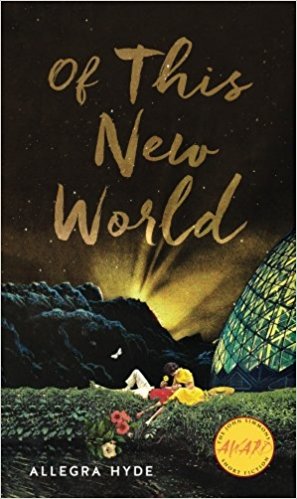Review: OF THIS NEW WORLD by Allegra Hyde

Review by TYLER CORBRIDGE
Of This New World, the debut collection of short stories from Allegra Hyde and winner of the 2016 John Simmons Award from the University of Iowa Press, is a book about longing for a better world, even an ideal world. The collection contains thirteen stories, beginning with the expulsion of Adam and Eve from the Garden of Eden and ending with the human colonization of Mars. The collection’s wide variety of settings, characters, and even genres represents the various ways we consider utopias. But if the characters in Of This New World fail to establish an ideal utopia, that’s because such a thing may not exist.
In the “Acknowledgements” page prefacing the collection, Allegra Hyde explains that “in etymological terms, the word utopia means both ‘good place’ and ‘no place’—a paradox by definition—and therefore best suited to the realm of imagination.” But most of the stories in Hyde’s wonderfully unique collection are about people who do not leave their utopias to the realm of imagination, striving instead to make their “good place” a reality, only to discover that in reality there is “no place” as good as they imagined.
The first of these stories, “After the Beginning,” is narrated by Eve as she tries to adjust to life after Eden with her mopey partner, Adam. Both Adam and Eve have their minds on their former utopia, but to separate effect. As a dreamer, Eve’s thoughts often drift to “that lush ambrosial garden,” but her dreaming propels her to action, while Adam only looks backward and sulks. This story acts as a template for several of the stories that follow, as we read of Puritans, Shakers, immigrants, environmental activists, war veterans, hippies, and Mars colonizers, some of whom are propelled to action by dreams of utopia, while others mourn their lost utopias.
The second story, “Shark Fishing,” is one of the collection’s most complex and rewarding. Set on the island of Eleuthera in the Bahamas, the story is told primarily through the perspective of Dawn, an environmental activist who—being eager to turn her dream of a clean and self-sustained civilization into a practical reality—begins work at Camp Hope, which is intended to be a “nerve center of an eco-revolution” and a “model for the world to change.” Throughout the story, Hyde deftly juggles multiple voices and time periods, allowing us to see the island not only through Dawn’s eyes but also through the natives’ eyes at present and the Puritan colonists’ eyes centuries before. As the story proceeds, Dawn has to confront the fact that her utopia is not everyone’s utopia—not for the Eleutherian natives who are without the economic luxury of prioritizing an eco-friendly lifestyle, and not for Fitz, an unwilling teen student at Camp Hope, who, seeing that Dawn has begun to doubt the success of her eco-utopia, taunts her by saying, “Don’t you believe? Aren’t you a believer?”
Fitz’ accusation is echoed elsewhere in the collection. In “The Future Consequences of Present Actions,” a dying Shaker named Elder Geary uses his last breath to publicly expose another man in the community for doubting their version of utopia. “Hear me!” he shouts. “We have an unbeliever among us.” And in the third story “Free Love,” a fifteen-year-old girl named Almond Joy struggles to find the courage to tell her father that she won’t be returning to his drug- and sex-fueled utopia, the Free Oaks Commune, because she too worries that she’ll be labeled something akin to an “unbeliever.” Almond, whose father taught her that “existential alignment requires living inside-out and upside-down,” says her “only hope is that he understands I’m trying, in my own way, to live inside-out and upside-down.”
Over and over again, Hyde’s characters, who couldn’t be more dissimilar in regard to their lifestyle and surrounding environment, find themselves facing the same dilemma: utopias are exclusive. They are for believers only. In fact, the work of turning one’s imagined utopia into a reality is the work of practical exclusion. Nowhere in Hyde’s collection is this made more clear than in the penultimate story, “Delight®,” wherein an over-commercialized community named Delight® elects to build a wall, or rather a “BigWhitePicketFence®,” to separate their utopia from the outside world. The story concludes:
And the fence, when it was finished, was AReallyGoodThing®. It wrapped all the way around Delight®, sealing our borders and protecting our Bright’N’ShiningFuture®. It’s a point of pride for everyone now: this wall that is too thick to punch through, too deep to tunnel under, and, most importantly, TooTallToSeeOut®.
Since Donald Trump was elected president, dystopian fiction sales have skyrocketed. Fierce political division, as well as looming environmental and ecological catastrophe, has caused American readers to delve deeply into worst-case scenarios. But Allegra Hyde’s Of This New World is useful for understanding this current dilemma. She is less interested in calling our attention to the possibility (or perhaps probability) of a dystopian future and more interested in drawing our attention to the present reality: that America is home to competing “utopias,” where “Make America Great Again” competes against “Hope We Can Believe In.” Hyde’s collection suggests we may never succeed in reconciling the two, but perhaps the effort alone is sufficient.